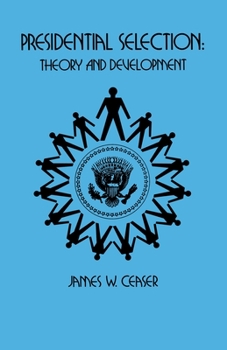Presidential Selection: Theory and Development
Select Format
Select Condition 
Book Overview
Examining the development of the process of presidential selection from the founding of the republic to the present day, James Ceaser contends that many of the major purposes of the selection system as it was formerly understood have been ignored by current reformers and modern scholars. In an attempt to reverse this trend, Professor Ceaser discusses the theories of selection offered by leading American statesmen from the Founders and Thomas Jefferson to Martin Van Buren and Woodrow Wilson. From these theories he identifies a set of criteria for a sound selection system that he then uses to analyze and evaluate the recent changes in the selection process.
Format:Hardcover
Language:English
ISBN:0691076022
ISBN13:9780691076027
Release Date:June 1979
Publisher:Princeton University Press
Length:392 Pages
Weight:1.05 lbs.
Customer Reviews
1 rating
Sometimes Oil and Water Does Mix
Published by Thriftbooks.com User , 23 years ago
Mixing common sense with social science is much like mixing oil and water. But sometimes it does work. This is one such case. Presidential Selection by James Ceaser is probably the best theoretical treatment of the development of why the American presidential selection process works the way it does. Ceaser understands that politicians act rationally, given the rules of the game. It is therefore essential to understand the rules. But is is even more important to understand why there are some rules and not others. Much of modern political science is good at explaining the formal and informal rules of presidential elections. This particular work is unique in explaining why we have the particular rules we do and how changing them has or can affect regime principles. Ceaser's touchstone in all of this is The Federalist, but it is read with a critical eye with regard both strengths and weaknesses. Overall the strengths outweigh the weaknesses because the founders' form of liberal democracy trumps any modern alternatives.





